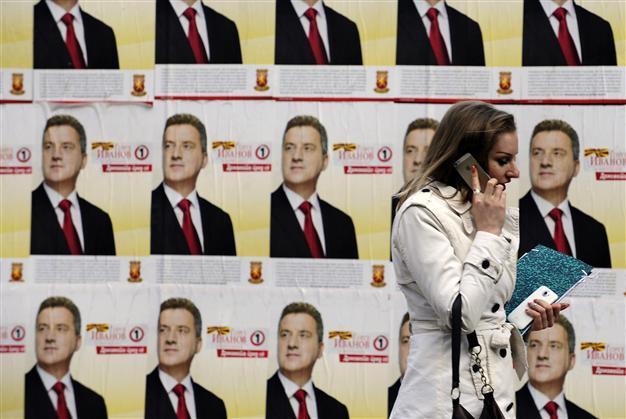Macedonians vote for president in test for ruling party
SKOPJE - Agence France-Presse

A woman walks past campaign posters of Macedonian ruling party VMRO-DPMNE presidential candidate and current President of Macedonia Gjorge Ivanov in Skopje April 11, 2014. REUTERS Photo
Macedonians voted for a new president Sunday in the polls seen as a test for the ruling party in the landlocked Balkan country and its path towards EU and NATO membership.The vote for the largely ceremonial presidential post is seen as a bellwether for the ruling VMRO-DPMNE party's prospects in early general elections later this month.
Incumbent President Gjorge Ivanov, who is bidding for a second five-year term, faces three challengers.
The latest opinion polls gave him around 30 percent support, with his main rival, opposition candidate Stevo Pendarovski, at 16 percent.
Electoral officials said 9.1 percent of some 1.7 million eligible voters had cast their ballots four hours after the polls opened at 0500 GMT.
If no candidate wins more than 50 percent of the votes cast in Sunday's first round, the two top rivals will go head-to-head in a run-off on April 27, when the parliamentary elections will also be held.
While the ailing economy with a jobless rate of over 25 percent has dominated the run-up to the polls, the opposition sought to shift the focus to a row with neighbouring Greece over Macedonia's name.
The opposition says the issue is hampering the country's economic and political development.
Since Macedonia won independence from the former Yugoslavia in 1991, Greece has raised objections to its name, arguing that it implies a territorial claim over the northern Greek province of the same name.
The row has stymied Macedonia's efforts to join both NATO and the European Union. It has been a candidate to join the 28-member EU since 2005.
Analysts say Skopje can either strike an unpopular deal with Greece that would unblock the stalemate or risk continued economic and political damage.
"Although the president has no final say in the name-dispute decision, the opposition has hinted its candidate would seek a joint stance in the country over the issue," analyst Ljubomir Frckoski told AFP.
The opposition forced the early parliamentary elections on April 27, accusing the ruling party of lagging behind with needed reforms.
Surveys suggest the ruling VMRO-DPMNE will win 59 of the 123 seats in the Macedonian parliament, with the opposition clinching 36 seats.
Voter Sonja Veskova, a 35-year-old manager, said she backed the opposition candidate for president.
"It would be good for Macedonia to have a balance, as I expect the ruling party to win the parliamentary elections," Veskova told AFP.
But 28-year-old nurse Ljubica Ilieva said she favours Ivanov.
"He is calm and clear on what we can expect. Other candidates are new and we are not sure what they offer," Ilieva said.
Many were disappointed with vague promises of economic progress in a country where the average monthly salary is some 350 euros ($480).
Macedonia was hit hard by the economic crisis in neighbouring Greece, but after years of contraction, output is expected to reach three percent this year.
"I am sick of all of them, who just give us empty promises, while only worrying about protecting their jobs," said 62-year old pensioner Ibrahim Veli.
The leader of the VMRO-DPMNE, Prime Minister Nikola Gruevski, has been in power since 2011, aided by a junior coalition partner, the ethnic Albanian Democratic Union for Integration.
Ethnic Albanians make up some 25 percent of Macedonia's population.
Iljaz Halimi of the opposition Democratic Party of Albanians is the only ethnic Albanian running for president.
Relations between Macedonians and ethnic Albanians have been strained since the end of a seven-month conflict in 2001 that pitted the country's armed forces against ethnic Albanian rebels.
More than 9,000 local and foreign observers will monitor the vote before the polling stations close at 1700 GMT.
At least 40 percent of voters should cast their ballots in order for the polls to be valid.
Preliminary results were expected later Sunday.
















